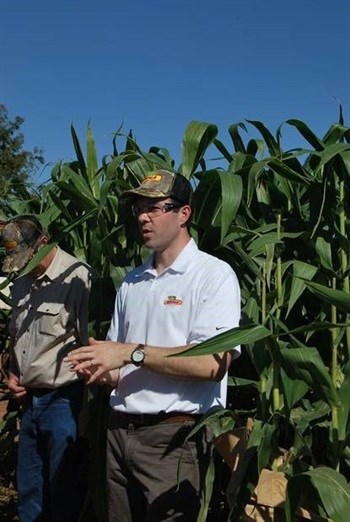An expert from the US, Loren Trimble, the new South African breeding lead for hybrid seed production at Monsanto, has arrived in South Africa to enhance breeding and testing activities that develop the local maize product pipeline and to contribute to food security.

Loren Trimble at Malelane Multi-Seasoned programme site.
“My job has taught me how important food is. Through breeding, we have the ability to produce enough to cater for the growing population. Not only doing it but making sure that we do it well and even better than we are doing it in South Africa right now,” said Trimble.
He grew up in Iowa, USA, but also spent a few years in Singapore when he was a child. He graduated from Iowa State University with BS and MS degrees in Agronomy and Plant Breeding, before attending the University of Wisconsin-Madison where he received his PhD in Plant Breeding and Plant Genetics.
MSP sites - where hybrid production trials are conducted
He only arrived at the beginning of June and has already visited several smallholder farms in Mpumalanga, including its Malelane farm.
Situated 30km from the Kruger National Park, 35km from Swaziland and 70km from Mozambique, Malelane is one of Monsanto’s Multi-Seasoned Programme sites (MSP). It is here where hybrid production trials are conducted and where most of Trimble’s job will come alive.
The farm is called an MSP site because the local weather allows the team to plant throughout the year. “We plant right through winter and speed up the breeding process by planting generations and doing productions which go into trials,” said Peter McKinnon, Malelane MSP site manager.
The main function of the farm is to produce sufficient high-quality seed to enable breeding, and to carry out the advancement process by providing hybrids for testing and for advanced nurseries.
Water Efficient Maize for Africa
The farm is also a testing facility for the Water Efficient Maize for Africa (WEMA) programme, which is drought-resilient maize developed for farmers who don’t have access to good seed. “Water availability is a big challenge for local farmers and here at Malelane, we are fortunate to use the drip irrigation system. You can irrigate about a third more hectares with the same water if you use this system,” said Trimble.
As the SA Breeding Lead, his vision is to contribute to global food production and agricultural productivity through developing networks, teams, people, and products.
Trimble hopes that his insights and knowledge will benefit his colleagues and the South African community and lead to a healthy and sustainable maize production pipeline.









































